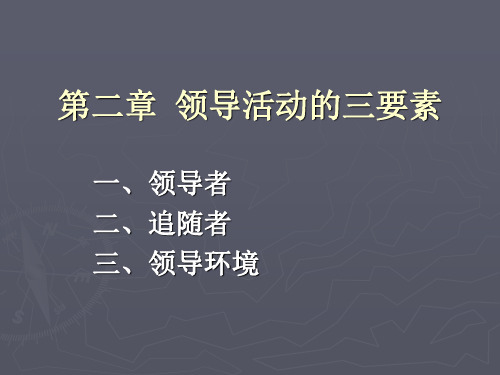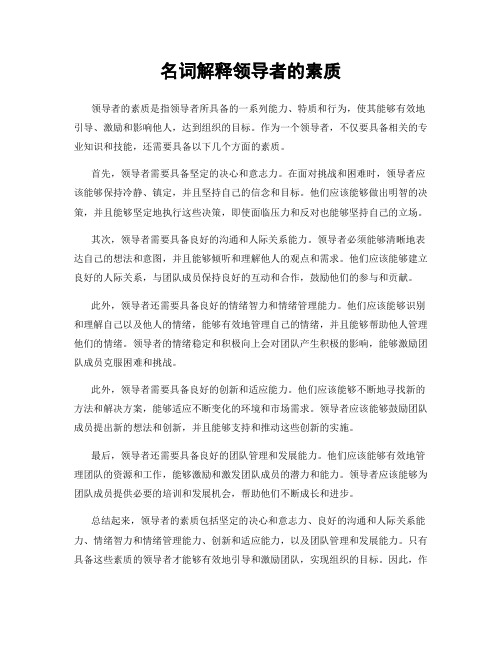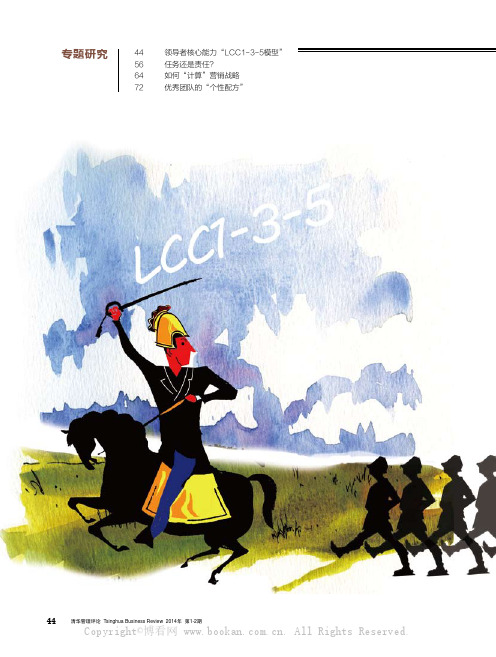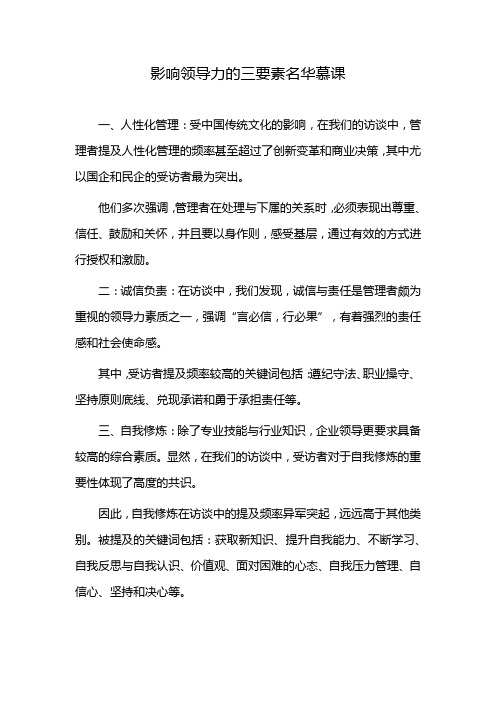领导者素质中的三个要素
第2章 领导活动的三要素

一、领导者 二、追随者 三、领导环境
一、领导者
► 何谓领导者?
从领导科学的角度, “领导者的唯一定义是其后面有追随者。一些人 是思想家,一些人是预言家,这些人都很重要, 而且也很急需,但是,没有追随者,就不会有领 导者。”(彼得٠德鲁克)
► 这是具有时代精神的概念,是关于领导者的
二、追随者
► 什么是追随者?
在领导活动中与领导者有共同的利益和(或)信 仰,追求共同组织目标的人。
► 追随者与领导者是领导活动的主体,他们一
起去畅想愿景,主动追求共同的利益,实现 共同的价值观念,是主人翁。
► 追随者与领导者的关系如何理解?
人格上平等
►不是人身依附关系,是平等的契约关系
追随愿景
追随者这一概念?为什么?
确定组织发展的远景与目标,制定战略 联合群众,形成联盟 激励和鼓舞
► 国内专家的观点:
决策 用人 沟通与协调 激励与鼓舞 思想政治工作
► 领导者的权力 ► 来源于两方面:职务权力和个人权力
► 弗伦奇和瑞文的权力观(权力的基法定性 专家性 参照性权力
本质定义(朱立言)
► 领导者是如何产生的? ► 从产生的形式看有两类:
从群体、社会中自发产生出来 经过选举或组织任命正式产生
►自古以来,有三条途径: ►读书 ►从军 ►从商
学而优则仕 历经九死一生的征战而成为统治者 优秀的企业领导人由商界走进政界
► 领导者的职责(领导做什么?)
► 约翰·科特的观点:
身份上相对
►领导者与追随者的地位处于变化之中,领导者可以变
成追随者,追随者也可能变成领导者
存在着互相追随的关系 权力上相互制约
名词解释领导者的素质

名词解释领导者的素质领导者的素质是指领导者所具备的一系列能力、特质和行为,使其能够有效地引导、激励和影响他人,达到组织的目标。
作为一个领导者,不仅要具备相关的专业知识和技能,还需要具备以下几个方面的素质。
首先,领导者需要具备坚定的决心和意志力。
在面对挑战和困难时,领导者应该能够保持冷静、镇定,并且坚持自己的信念和目标。
他们应该能够做出明智的决策,并且能够坚定地执行这些决策,即使面临压力和反对也能够坚持自己的立场。
其次,领导者需要具备良好的沟通和人际关系能力。
领导者必须能够清晰地表达自己的想法和意图,并且能够倾听和理解他人的观点和需求。
他们应该能够建立良好的人际关系,与团队成员保持良好的互动和合作,鼓励他们的参与和贡献。
此外,领导者还需要具备良好的情绪智力和情绪管理能力。
他们应该能够识别和理解自己以及他人的情绪,能够有效地管理自己的情绪,并且能够帮助他人管理他们的情绪。
领导者的情绪稳定和积极向上会对团队产生积极的影响,能够激励团队成员克服困难和挑战。
此外,领导者需要具备良好的创新和适应能力。
他们应该能够不断地寻找新的方法和解决方案,能够适应不断变化的环境和市场需求。
领导者应该能够鼓励团队成员提出新的想法和创新,并且能够支持和推动这些创新的实施。
最后,领导者还需要具备良好的团队管理和发展能力。
他们应该能够有效地管理团队的资源和工作,能够激励和激发团队成员的潜力和能力。
领导者应该能够为团队成员提供必要的培训和发展机会,帮助他们不断成长和进步。
总结起来,领导者的素质包括坚定的决心和意志力、良好的沟通和人际关系能力、情绪智力和情绪管理能力、创新和适应能力,以及团队管理和发展能力。
只有具备这些素质的领导者才能够有效地引导和激励团队,实现组织的目标。
因此,作为一个领导者,我们应该不断努力发展和提升这些素质,以更好地履行我们的领导责任。
领导者核心能力“LCC1-3-5模型”

领导者核心能力“LCC1-3-5模型”文 / 吴维库 孔茗领导者核心能力“LCC1-3-5模型”吴维库:清华大学经济管理学院领导力与组织管理系教授,博士生导师孔茗:清华大学经济管理学院博士研究生无论是学术还是实践,领导者历来就是关注的“焦点”。
领导能力的高低关系着组织的发展,尤其是“一把手”的能力直接影响着组织的兴衰成败。
但是,任何一种单一的能力都难以成功地完成某项活动,因为任何一项活动都往往是多种能力结合的结果。
因此,对于领导者来说,具备能力的组合非常重要,尤其是能为组织带来持续竞争优势的核心能力。
参考1990年美国学者普拉哈德和哈默尔提出的组织的核心能力的概念:“累积形成的独特知识组合,满足有价值、稀缺、难模仿和不可替代”,我们对领导者的核心能力(Leader ’s Core Capability ,LCC )定义为:在引领组织实现目标的过程中,领导者独特的人格、思想、知识、经验和技能组合而成的体系,是领导者适应情境、整合资源、引领变革的基础,具有自我完善和给组织带来持续竞争优势的特征。
领导者的核心能力是从领导者的态度、能力和行为三个维度出发建立起来的,是一个体系,它的关键词是“目标、独特、体系、情境和持续”。
领导者的核心能力是缔造组织核心能力的基础,但它们之间是有区别的,它们之间最大的区别在于:组织的核心能力具有“难模仿”的特征,但领导者的核心能力却能够被模仿——因为领导者是通过树立榜样来领导他人的,这就是模仿,即希望下属能够模仿领导者的行为。
职业化是一种工作状态的标准化、规范化和制度化,即在合适的时间、合适的地点,用合适的方式、说合适的话、做合适的事,是领导者自我管理从而胜任不同角色的能力。
职业化包括三个维度:职业化素养、职业化行为和职业化技能。
对领导者来说,职业化素养是指作为一个领导者应该具备的道德素质,类似于“企业家精神”,包括品德、知识、胸怀、冒险和竞争的天性等。
领1P职业化Professional领导者的核心能力“1-3-5模型”为了将领导者核心能力(LCC)系统地组织和表达出来,我们从态度、能力和行为三个维度出发来构建模型(体系)。
影响领导力的三要素名华慕课

影响领导力的三要素名华慕课
一、人性化管理:受中国传统文化的影响,在我们的访谈中,管理者提及人性化管理的频率甚至超过了创新变革和商业决策,其中尤以国企和民企的受访者最为突出。
他们多次强调,管理者在处理与下属的关系时,必须表现出尊重、信任、鼓励和关怀,并且要以身作则,感受基层,通过有效的方式进行授权和激励。
二:诚信负责:在访谈中,我们发现,诚信与责任是管理者颇为重视的领导力素质之一,强调“言必信,行必果”,有着强烈的责任感和社会使命感。
其中,受访者提及频率较高的关键词包括:遵纪守法、职业操守、坚持原则底线、兑现承诺和勇于承担责任等。
三、自我修炼:除了专业技能与行业知识,企业领导更要求具备较高的综合素质。
显然,在我们的访谈中,受访者对于自我修炼的重要性体现了高度的共识。
因此,自我修炼在访谈中的提及频率异军突起,远远高于其他类别。
被提及的关键词包括:获取新知识、提升自我能力、不断学习、自我反思与自我认识、价值观、面对困难的心态、自我压力管理、自信心、坚持和决心等。
领导干部要把握好领导三要素

基层领导干部要把握好领导三要素现在处于知识经济时代,知识经济催人奋进,但这个时代也是心浮气燥的时代,给领导者在领导环境、领导相关的要素方面,提出了很多新的问题,需要加以解决。
环境的复杂化,使领导条件更加复杂,酸甜苦辣都有。
基层领导干部要顺应时代要求,处理纷繁复杂的矛盾与问题,甚至临危受命,处理突发性事件,更需要把握好领导三要素。
领导是策划者。
策划就是要有好思路。
好思路是清晰的、明了的、简洁的。
一个单位、一个领导班子或是领导者个人,一个年头,一个季度,一个月,一个礼拜,应该干什么,按什么方式去做,工作重点是什么,工作的节奏如何把握,都应该有一个明确的思路。
不记在本子上,不写在纸张上,但一定要印在脑海里。
工作思路不能脱泥带水,东一棒子,西一榔头,乱了章法,否则就象无头苍蝇东奔西窜,什么事情也干不好。
策划就是要有好点子。
一个好点子胜过一百个将军,胜过一个军队的士兵。
好点子就是物资,就是金钱,就是效率。
好点子出在关键时刻。
工作进行到一定程度,出现“肠梗阻”,推不动,发生了矛盾和困难,无从下手,在关键时刻,作为一个领导者,能灵光一现,出个点子,使问题迎刃而解,矛盾烟消云散,“肠梗阻”一路畅通。
这样的点子就是金点子。
好点子出在紧要关头。
大敌当前、大难临头、大祸来临、大灾突发,领导受命于危难时刻,不能畏惧,临降脱逃,不能退缩,也不能惊慌失措。
2002年,荷叶河里金叉石墨矿发生透水事故,19名矿工在井下作业,生死不明,两天的抢险,进展十分缓慢。
县委、政府领导改变策略,决定从风井附近另打一巷道至发生险情的主巷道,加快了掘进速度。
仅用三天时间,成功营救出15名矿工,大矿难度成一般事故,所以点子要出在紧要关头。
好点子出在工作一筹莫展,进退维谷,事情没有转机,效果不好的时候。
近年来,桂阳县有一批老上访户,无论怎样做思想工作,还是继续上访,谁来做工作都无济于事,让很多的单位和领导干部伤透了脑筋,久而久之成为了积案,有的甚至严重损害了党和政府在人民群众中的形象,政府的公信力也受到影响。
管理者必备的领导力三要素(Thr...

管理者必备的领导力三要素(Three essential factors ofleadership for Managers)Effective management of leaders' candid communicationDisorderly management, even if you are busy, not necessarily good results. Only by setting clear goals, enhancing communication with employees and building trust with each other, can they achieve twice the result with half the effort. These elements are now the cornerstone of effective management.Cici Fuss was a king who offended God in ancient Greek mythology. His punishment was to push a boulder on a steep slope in hell, watch it roll back to the foot of the mountain, and then repeat this process.The ancient Greek myth description of hell like modern employees living conditions: busy with those meaningless and not at the end of the task. Too many companies operate in a vacuum, not only employees, but even their bosses, don't know what's valuable. Work lost direction, employees just move forward according to inertia, soon do not know where they are.Set clear management objectivesAlthough leaders can't change the tasks of the organization, they can change their attitudes towards work by setting clear organizational or team goals. By identifying the goals and trying to achieve the desired results, effective leaders make work meaningful and clear. Task is still the original task, but its important position in the minds of employees has beengreatly improved.Take the medical industry as an example. Different from other industries, is advantageous in medical industry is the inherent target basic satisfactory: many people choose the industry work in order to help others live better, in addition to other more rarely consider what noble goal. Even so, the medical organizations that allow employees and patients to achieve maximum satisfaction will also try to cultivate a strong sense of mission and goal.In a medical organization with more than 60 hospitals, leaders regularly conduct surveys to ask if employees' mission and core values make your job more meaningful". The organization integrates goals and values into the recruitment process, employee assessment and strategic plan of the whole organization. The organization's daily work is entirely centered on its mission and values, so the percentage of national satisfaction on this issue has taken a major leap from 35% in 2002 to 61% in 2004.No matter what they sell or where they are, excellent managers in all industries instill a clear sense of purpose to their employees. They not only from the customer service, honest work, do best in the industry and many other aspects of interpretation of the organization's mission, but also to explain how to make all the important mission to the specific implementation of the goals of the team and everyone in daily work.But it's strange that many leaders put it on the shelf after making the corporate values, and they didn't really put it intopractice. A leader once told me, "we've printed payroll cards, and everyone has one.". Posters with corporate values were posted in every meeting room." But there are also inconsistencies between employee behavior and organizational values, and leaders are puzzled. We found that although the goal is a basic management skill, there are very few leaders who actually do that.Good managers connect employees' goals to the goals of the company. And that connection is leadership - when it happens, it works. In fact, a clear goal is so powerful that it has become the center of many legends. Almost all cultures have created myths about adventure: dangerous, desperate, but finally successful. The reason why heroes are willing to take risks at any cost is that they have lofty goals in mind.Honest communication with employeesIn the early 1990s, I read an employee magazine at an energy company in the rocky mountains. One of the articles said: the company's new CEO disclosed,He agreed to carry out the "must know" policy when communicating with employees; but at the same time, he thought that telling employees any information that had nothing to do with their work would distract their attention, and it would be a waste of time.I guessed that he could do it for at least one year, but in fact he did it much shorter. By the time he left, the entire energy company was in disarray.More interestingly, an employee survey conducted by management consulting company recently in 336 organizations shows that only 1/3 of employees know or understand their boss's business strategy. At first, it sounds like no big deal, but many people don't know that keeping employees informed is the biggest factor that leads to dissatisfaction.The job of a senior leader is not to monopolize all or most of the business strategy, and his job is to communicate with the employees and to motivate them to complete the company goals. So should managers at the grassroots level. You have to give some trust to your employees' ability, which is a basic requirement for many people.General Electric's former CEO Jack. Welch has given a good explanation: "I think any company should try to make every employee's brain work, if you don't keep thinking about how to make employees more valuable, you will have no chance to win. What is an alternative resource? What is a wasted brain? What is irrelevant? What is the anger or boredom of the workforce? It doesn't make any sense to say that."Leaders who are good at communicating openly with employees can basically do business without using power and threats. As Dwight Eisenhower said, "you can't lead by hitting your head - it's aggression, not leadership."."Of course, leaders can also communicate on other levels, such as example, gesture, decision, attention and appreciation, rewards and punishments, and actions. But there's one thing they can't do, that's to stay in the office and give orders.Without honest communication, managers can't manage their employees well. Step by step, honest communication will open the door to success for you and your employees or your company.Take DHL, the largest express company in the world, as an example. A few years ago, the company realized that it needed to take some special steps to strengthen its position in the United States and expand its share of the U.S. market, when its market share was only third. So the company identified the "legendary customer service" core strategy, and then introduced the "I'm responsible" advertising campaign. In the successful implementation of the strategy and success of marketing activities at the same time, DHL realized that only employees really set up special customer service brand awareness, these strategies will get real success, so the company so that all employees can participate."As long as we get the same direction of the company, then every sector, every region has a voice in setting its goals," said Scott, executive vice president of DHL's human resources department. North Carter said, "everyone should be involved in, should ensure that each driver, managers and employees understand this goal, which is crucial to strategic performance and ultimate success."."Today, the popularity of DHL has been greatly improved, and operating income in the United States has also increased substantially. Whether for the future development of DHL, for DHL managers or any other enterprise in the world, honest communication is the key to success and becoming an industry leader.Building trust through communicationTrust is often regarded as the quality of people's interaction, not leadership skills, which is a wrong understanding. It turns out that trust is the core concept in business, and it can even affect the economic growth of a country.Claremont University (Claremont) economics professor Paul Zack found that in a society, trust can encourage investment, reduce transaction costs. In a society where people trust less than 30%, poverty will increase significantly.This applies to a business as well as a team. In an organization where everyone trusts its leader, employees will give higher returns to the organization. When an employee thinks that the manager is really thinking about him, it will motivate him to devote himself to the work and the enterprise, which will bring higher dedication and improve the profit margin of the enterprise.Description of Harvard Business School professor Luis Barnes will trust phenomenon as the reciprocity theory: in short, people always reciprocated. For managers who want to build trust in the organization, this means that he must respect employees, listen to their opinions and suggestions, treat them fairly, focus on the overall interests of the organization rather than personal success.This is an impressive list of qualities, for most of us to have these qualities may be a bit difficult. We found that if leaderswant to build trust with employees, he should always appear in front of employees. Experience also shows that a very simple way to solve common trust problems is to get out of the office and mingle with employees. In organizing improvement seminars, we always ask, "what is the biggest obstacle to improving communication and trust between you and your boss?"" There are few exceptions, and the first response is always "I've never seen him. He's always in meetings."".This is the problem with an East Asian coast organization, whose staff survey shows that top leaders have a very low degree of trust. From a subsequent thematic survey, the organization's CEO rarely left his office, and his communication with employees was carried out by e-mail. The staff commented on him, "he sits in a limousine every morning, arrives at the fourth floor, and then we never see him again."." If employees don't even know who the person in the CEO office is, how do they expect them to build a trust relationship with the top? That CEO has left the organization now.Another company, in its first survey, had a low credit score. However, the company CEO immediately attached importance to the result, and held the so-called "town hall meeting", which was actually a lunch with food, but employees had the opportunity to talk with the president. He also asked all vice presidents to communicate with employees in the department or other departments. Results in the second survey, the trust scores of leaders were greatly improved, and the satisfaction of employees was also improved.Trust is a complicated problem, but we can simplify the solution.Building trust relationship with employees starts with the appearance of leaders. This is a starting point - a starting point that can attract people's attention and appreciation.。
领导者的三个要素

领导者的三个要素领导者的三个要素领导者是一个组织中非常重要的角色,他们负责指导和激励团队成员达到共同的目标。
一个优秀的领导者可以提升团队的效率和凝聚力,带领团队走向成功。
然而,要成为一个出色的领导者,并不是一件容易的事情。
下面我将介绍领导者的三个关键要素。
第一个要素是明确的愿景。
优秀的领导者必须有一个明确的目标和愿景,能够清楚地展示给团队成员看到未来的方向。
这个愿景应该是激励人心的,能够激发团队成员的潜力和动力。
同时,领导者还应该能够将这个愿景有效地传达给团队,让每个人都明白他们所追求的目标。
只有明确的愿景才能激发团队的创新和动力,帮助团队迈向成功。
第二个要素是良好的沟通能力。
作为一个领导者,良好的沟通能力是必不可少的。
领导者需要与团队成员进行有效的沟通,确保团队的目标和任务得到明确的传达。
在沟通过程中,领导者应该倾听团队成员的意见和建议,尊重每个人的观点。
同时,领导者还应该能够清晰地表达自己的想法和决策,避免产生误解和混乱。
良好的沟通能力可以促进团队的合作和协调,提高工作效率。
第三个要素是激励和培养团队成员。
一个优秀的领导者应该能够激励和激发团队成员的潜力,帮助他们实现自己的个人目标。
领导者应该了解每个团队成员的优点和不足,鼓励他们发挥自己的长处,同时提供必要的培训和支持,帮助他们提升自己的能力。
同时,领导者还应该能够给予团队成员适当的认可和奖励,让他们感受到自己的工作价值和成就感。
激励和培养团队成员可以提升团队的凝聚力和士气,推动团队向着目标迈进。
以上便是领导者的三个要素:明确的愿景、良好的沟通能力和激励和培养团队成员。
这三个要素互相关联,共同构成了一个优秀的领导者。
一个拥有明确愿景的领导者能够激发团队成员的动力,良好的沟通能力可以促进团队的合作和协调,而激励和培养团队成员则能提升团队的凝聚力和士气。
希望这些要素能够对正在或将要成为领导者的人有所启发,让他们能够成为一个出色的领导者。
“三圈理论”的核心思想

“三圈理论”的核心思想“三圈理论”的核心思想表现在:(一)阐明了价值、能力、支持三者的相关性“三圈理论”强调价值、能力、支持三者的相关性,三个要素密切联系、相互作用。
领导者的职责和主要任务,就是判断公共价值、提高组织能力、获取广泛支持,使三个圈最大限度地接近和重合,从而达到最佳的政策效果。
就三圈内部三个要素的关联度而言,不同的条件组合有不同的作用方向。
领导者必须明确决策方案或计划项目的优势所在,了解应该争取和发展哪些要46素,抑制和排除哪些可能造成不良后果的情况,使三个要素科学合理地结合,实现有机的统一。
(二)强调了公共价值的根本性相对于能力、支持而言,价值最为根本,是第一位的。
价值是决策优先考虑的因素,是决策的前提条件。
另外,从三个要素的性质、特点、评估及实际操作看,能力与支持(态度)易于r解、测定,比较明了,而对计划项目的价值判断则是比较难的,属于主观的评价,有时候价值圈的边界比较模糊,特别是对一个重大的计划项目究竟能创造多大的公共价值,往往仁者见仁、智者见智。
这时,领导者的选择决断非常关键。
越是重大项目,越应注意价值的判断。
因此,领导者推动三圈相互作用不是简单地平均使用力量,而是要将三圈向正确、有利的方向移动。
(三)突出了创新的重要性在“三圈理论”的分析框架中,所谓创新,就是要努力实现具有公共价值,但目前尚无能力或尚未得到相关者支持的计划项目。
领导者应该有梦想,为社会公众谋求和创造更高层次、更大收益的公共价值,然而创新总会有困难,总会存在风险,这对领导者是严峻的考验,特别是推行一项改革的政策措施,往往阻力重重。
领导者的重要职责和作用,就是要让公众真正认识到改革的好处,认同决策方案或计划项目的价值,从而自觉地给予支持和配合。
“三圈理论”将领导力定义为“将新的尚不受欢迎的现实,呈现给个人、组织或整个社会,让他们认可,并成功地适应新的2010年第7期辱’现实的过程。
”这一定义充分表达了创新在公共行政中的重要作用。
- 1、下载文档前请自行甄别文档内容的完整性,平台不提供额外的编辑、内容补充、找答案等附加服务。
- 2、"仅部分预览"的文档,不可在线预览部分如存在完整性等问题,可反馈申请退款(可完整预览的文档不适用该条件!)。
- 3、如文档侵犯您的权益,请联系客服反馈,我们会尽快为您处理(人工客服工作时间:9:00-18:30)。
领导者素质中的三个要素
由于中国行政体系中对领导选拔方式采用相马不赛马的特殊机制,所以每每庸官批量出现说蠢话、办蠢事时,领导者的素质问题都一再被提及。
笔者结合个人的观察和实践,对领导者的素质要求提出三个基本要素:智力、良心和经历。
智力要素容易理解,它可以包括机智、聪明、智慧等等元素。
其中笔者理解的机智是指一种大脑快速反应,具体表现为幽默地反驳或巧妙转移话题之类的快速应答。
试想如果官员都有此技能,我们可能会少听到很多雷人的言论,诚然生活中的娱乐新闻少了,但政府的威信还是可以提升。
而所谓聪明往往指面对问题和困难时能及时提出时间段,见效快的有效解决办法的能力。
而智慧则是侧重于一种战略上的远见,但此种措施往往是见效的时间周期比较长。
由此可见,智力绝不是指做个智力测验那么简单,这其中也包括及时、短期、长期等等方面的检测。
如果官员能在几方面通杀自然是我们百姓之福,其实如果能具备一两方面已是极大进步。
其实智力要素的重要并非只有笔者以为,但遗憾的是更多人在行政实践中把某些官员的狡猾或是权谋理解为一种智力。
而笔者定义的狡猾是在智力水平不足情况下,利用信息不对称而争取优势的方法。
信息不对称是一种最没有智力含金量的管理方式,可惜我们的管理文化中还经常以此为荣,以此为经验或法宝,这也是为什么如此多领导热衷于保密,对造假谎报也充满理解。
所以我们的领导一定要反思,如果你的自信来源于掌握了别人没有掌握的信息,那这种优势无异于沙滩上建起的高楼。
我们第二种对智力常见的误解是把智力等同于权谋。
笔者对权谋的定义是在智力水平不足的情况之下,通过专注和专业化来弥补智力差距。
记得年轻时第一次接触《厚黑学》时很为其倾倒,认为这才是人生的智慧,但随着对社会的认识,笔者才逐步醒悟权谋文化对中华进步地影响。
(具体见《权谋与智慧》)
良心一词越来越少地被提及,我们甚至已经不去思索其定义,或者简单地认为是一种源于自己内心关于是非的道德判断。
正是由于良心本身存在基于独立地思考,所以很容易被强大的组织文化所异化,因为在高效的组织文化中,独立的思考都将被视为异端。
回顾近二十年的行政经历,出来没听说哪个领导要求下属按良心办事,只知道服从命令、听指挥才是硬道理,这可能也就良心正在被无意或有意淡化的原因。
正是我们少了用良心思考,我们的领导者越来越缺乏体会别人痛苦的能力。
不久前,一名高官在电视节目中说:“我们免费为一农村大妈做了白内障手术。
当摘下纱布时她看见了,她的确要感谢党!感谢政府!靠她自己,她一辈子也做不起手术”。
然后主持人反问道:“她辛苦一辈子,连个白内障手术都做不起,那她得恨谁呢?”
经历要素是指领导者成长的轨迹,由于中国行政管理中特殊的零起步现象,即没有人为以后同事记录目前的工作内容,致使每一任行政领导都无法知道前任的具体工作内容,和当时重大决策后的特殊背景。
于是往往呈现出有样学样,为什么行政机关如此文山会海?原因之一就是以前都是这么做的。
特别当领导在一个新的领域开始工作时,又要用极大的精力去甄别下属的困难中有多少虚假成分,而且在我们行政体系中,各种业务、各个部门都有其特殊的潜规则,特别是在改革措施举步维艰时,更要区分是下属由于利益不愿改,还是出于能力不能改,或是条件确实缺乏的无法改。
所以如果能对领导的业务和部门有过实践的经历,对任何领导都是一个宝贵财富。
当然现代管理体制对领导者的素质有很多要求,但就其主次和现状而言,笔者还是认为智力、良心和经历在其中占有更重要的作用。
但在现行体制中,如果真的有官员具备了特别是前两种素质,那其痛苦又会比工作成绩大得多。
